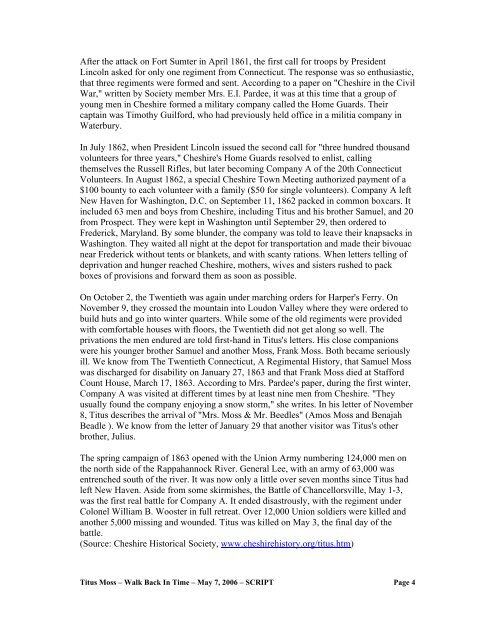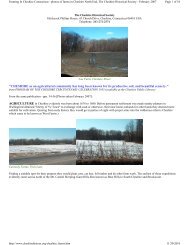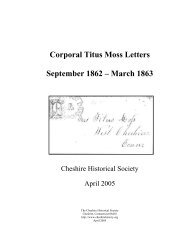titus moss - The Cheshire Historical Society
titus moss - The Cheshire Historical Society
titus moss - The Cheshire Historical Society
- No tags were found...
You also want an ePaper? Increase the reach of your titles
YUMPU automatically turns print PDFs into web optimized ePapers that Google loves.
After the attack on Fort Sumter in April 1861, the first call for troops by President<br />
Lincoln asked for only one regiment from Connecticut. <strong>The</strong> response was so enthusiastic,<br />
that three regiments were formed and sent. According to a paper on "<strong>Cheshire</strong> in the Civil<br />
War," written by <strong>Society</strong> member Mrs. E.I. Pardee, it was at this time that a group of<br />
young men in <strong>Cheshire</strong> formed a military company called the Home Guards. <strong>The</strong>ir<br />
captain was Timothy Guilford, who had previously held office in a militia company in<br />
Waterbury.<br />
In July 1862, when President Lincoln issued the second call for "three hundred thousand<br />
volunteers for three years," <strong>Cheshire</strong>'s Home Guards resolved to enlist, calling<br />
themselves the Russell Rifles, but later becoming Company A of the 20th Connecticut<br />
Volunteers. In August 1862, a special <strong>Cheshire</strong> Town Meeting authorized payment of a<br />
$100 bounty to each volunteer with a family ($50 for single volunteers). Company A left<br />
New Haven for Washington, D.C. on September 11, 1862 packed in common boxcars. It<br />
included 63 men and boys from <strong>Cheshire</strong>, including Titus and his brother Samuel, and 20<br />
from Prospect. <strong>The</strong>y were kept in Washington until September 29, then ordered to<br />
Frederick, Maryland. By some blunder, the company was told to leave their knapsacks in<br />
Washington. <strong>The</strong>y waited all night at the depot for transportation and made their bivouac<br />
near Frederick without tents or blankets, and with scanty rations. When letters telling of<br />
deprivation and hunger reached <strong>Cheshire</strong>, mothers, wives and sisters rushed to pack<br />
boxes of provisions and forward them as soon as possible.<br />
On October 2, the Twentieth was again under marching orders for Harper's Ferry. On<br />
November 9, they crossed the mountain into Loudon Valley where they were ordered to<br />
build huts and go into winter quarters. While some of the old regiments were provided<br />
with comfortable houses with floors, the Twentieth did not get along so well. <strong>The</strong><br />
privations the men endured are told first -hand in Titus's letters. His close companions<br />
were his younger brother Samuel and another Moss, Frank Moss. Both became seriously<br />
ill. We know from <strong>The</strong> Twentieth Connecticut, A Regimental History, that Samuel Moss<br />
was discharged for disability on January 27, 1863 and that Frank Moss died at Stafford<br />
Count House, March 17, 1863. According to Mrs. Pardee's paper, during the first winter,<br />
Company A was visited at different times by at least nine men from <strong>Cheshire</strong>. "<strong>The</strong>y<br />
usually found the company enjoying a snow storm," she writes. In his letter of November<br />
8, Titus describes the arrival of "Mrs. Mos s & Mr. Beedles" (Amos Moss and Benajah<br />
Beadle ). We know from the letter of January 29 that another visitor was Titus's other<br />
brother,<br />
Julius.<br />
<strong>The</strong> spring campaign of 1863 opened with the Union Army numbering 124,000 men on<br />
the north side of the Rappahannock River. General Lee, with an army of 63,000 was<br />
entrenched south of the river. It was now only a little over seven months since Titus had<br />
left New Haven. Aside from some skirmishes, the Battle of Chancellorsville, May 1-3,<br />
was the first real battle for Company A. It ended disastrously, with the regiment under<br />
Colonel William B. Wooster in full retreat. Over 12,000 Union soldiers were killed and<br />
another 5,000 missing and wounded. Titus was killed on May 3, the final day of the<br />
battle.<br />
(Source: <strong>Cheshire</strong> <strong>Historical</strong> <strong>Society</strong>, www.cheshirehistory.org/<strong>titus</strong>.htm)<br />
Titus Moss – Walk Back In Time – May 7, 2006 – SCRIPT Page 4




